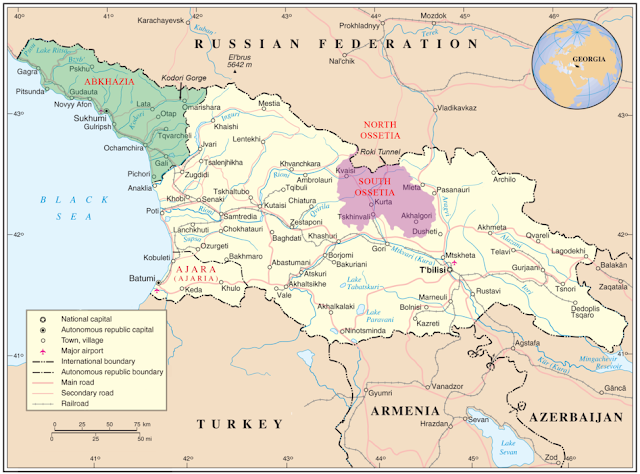Exploring Georgia's Beautiful Tapestry: A Journey Through Its Map
Georgia, situated at the crossroads of Eastern Europe and Western Asia, is a land of breathtaking landscapes, rich history and warm hospitality. Its map is a testament to the diverse natural beauty and cultural heritage of this country. Join us on a virtual journey through the fascinating Georgia map to discover the hidden gems and iconic sites that make this country a true gem in the Caucasus region.
Geography of Georgia
The first step in our exploration is to understand the geography of Georgia. The country is approximately the size of West Virginia in the United States and is strategically located at the crossroads of Eastern Europe and Western Asia. To the west, the Black Sea coastline adds a touch of Mediterranean charm to the country, while the Greater Caucasus mountain range dominates the northern border.
Mountains and peaks
The Greater Caucasus Mountains are the backbone of Georgia's northern landscape, offering some of the most spectacular scenery in the country. Major peaks such as Mount Shekhra, Georgia's highest point, and Mount Kazbek, known for their mythological significance, are popular destinations for trekkers and mountaineers. These mountains are a paradise for adventure seekers and nature lovers.
Valleys and plateaus
Moving south, the landscape changes to lush green valleys and fertile plateaus. The Rioni and Kura river valleys are the breadbasket of the country, producing a variety of crops, including grapes for Georgia's renowned wine production. The Shida Kartli Plateau, located between the Lesser Caucasus and the Greater Caucasus, is home to ancient cave cities such as Uplistsikhe and centuries-old fortresses such as Gori Castle.
Black sea coast
Georgia's western border meets the Black Sea, where you'll find picturesque seaside cities like Batumi and the historic city of Poti. The coastline boasts beautiful beaches, botanical gardens and a vibrant nightlife. Batumi, in particular, is famous for its modern architecture and the Batumi Botanical Garden, which displays a remarkable collection of flora from around the world.
Historical sites
The map of Georgia is a testament to its rich history, with many historical sites scattered across the country. The capital city, Tbilisi, is a vibrant mix of old and new, including medieval churches, modern architecture and a bustling art scene. The ancient cave city of Uplistsikhe, the historic city of Mtskheta, and the medieval monasteries of Gelati and Svetitskhoveli are UNESCO World Heritage Sites that transport visitors back in time.
Cultural diversity
The map of Georgia is a mix of diverse cultures and ethnicities. The country is home to several ethnic groups, with Georgians in the majority. However, you'll also find communities of Armenians, Azeris, and other groups, each contributing to Georgia's unique cultural tapestry. This cultural diversity is reflected in the country's food, music and traditions.
Exploring the map of Georgia is like embarking on a journey through time and nature. From the rugged peaks of the Greater Caucasus to the tranquil beaches of the Black Sea coast and from ancient monasteries to vibrant cities, Georgia offers a wealth of experiences for every traveller. Its map is not just a guide; It is an invitation to discover the beauty, history and warmth of this remarkable country. So, pack your bags and get ready to explore the incredible tapestry of Georgia.
Here are some interesting facts about the country Georgia:
- Location: Georgia is located at the intersection of Eastern Europe and Western Asia, making it a transcontinental country. It is bordered by Russia to the north, Azerbaijan to the south-east, Armenia to the south and Turkey to the south-west.
- Capital and Largest City: The capital of Georgia is Tbilisi, which is also the largest city in the country.
- Language: The official language is Georgian. It has its own unique script, making it one of the oldest written languages still in use today.
- Cultural Heritage: Georgia is known for its rich cultural heritage. It is considered one of the oldest Christian countries in the world, with Christianity having been the dominant religion since the beginning of the 4th century.
- Wine Production: Georgia is often called the "Cradle of Wine" as it is considered one of the birthplaces of wine production. The traditional Georgian winemaking method, which uses clay pots called kvevri, has been recognized as part of UNESCO's intangible cultural heritage.
- Diverse Geography: Georgia's geography is incredibly diverse, from high mountains in the north (Greater Caucasus) to lush valleys and plateaus in the central regions. The country also has a beautiful Black Sea coast.
- Cave Cities: Georgia is home to fascinating cave cities like Aplistsikhe and Vardzia, which were carved into the rocks and used as ancient settlements.
- Cuisine: Georgian cuisine is famous for its unique flavors and dishes. Some popular Georgian foods include khachapuri (cheese-filled bread), khinkali (dumplings), and various grilled meats.
- Independence: Georgia regained its independence from the Soviet Union on April 9, 1991 and has been an independent nation since then.
- Alphabet: The Georgian alphabet is one of 14 alphabets existing in the world and is known for its distinctive script, which consists of 33 letters.
- Mountains and Peaks: Some of the highest peaks in Europe are located in the Greater Caucasus Mountains of Georgia, including Mount Shkhara and Mount Kazbek, both of which exceed 5,000 meters in height.
- Tourism: Georgia has become an increasingly popular tourist destination in recent years due to its natural beauty, historical sites and warm hospitality.
- Flag: The Georgian national flag is a white field with a large red cross extending to the sides. It is one of the oldest national flags in continuous use.
- Literary heritage: Georgia has a strong literary tradition, with notable poets and writers such as Shota Rustaveli, Ilia Chavchavadze and Nodar Dumbadze contributing to the country's literary heritage.

Comments
Post a Comment